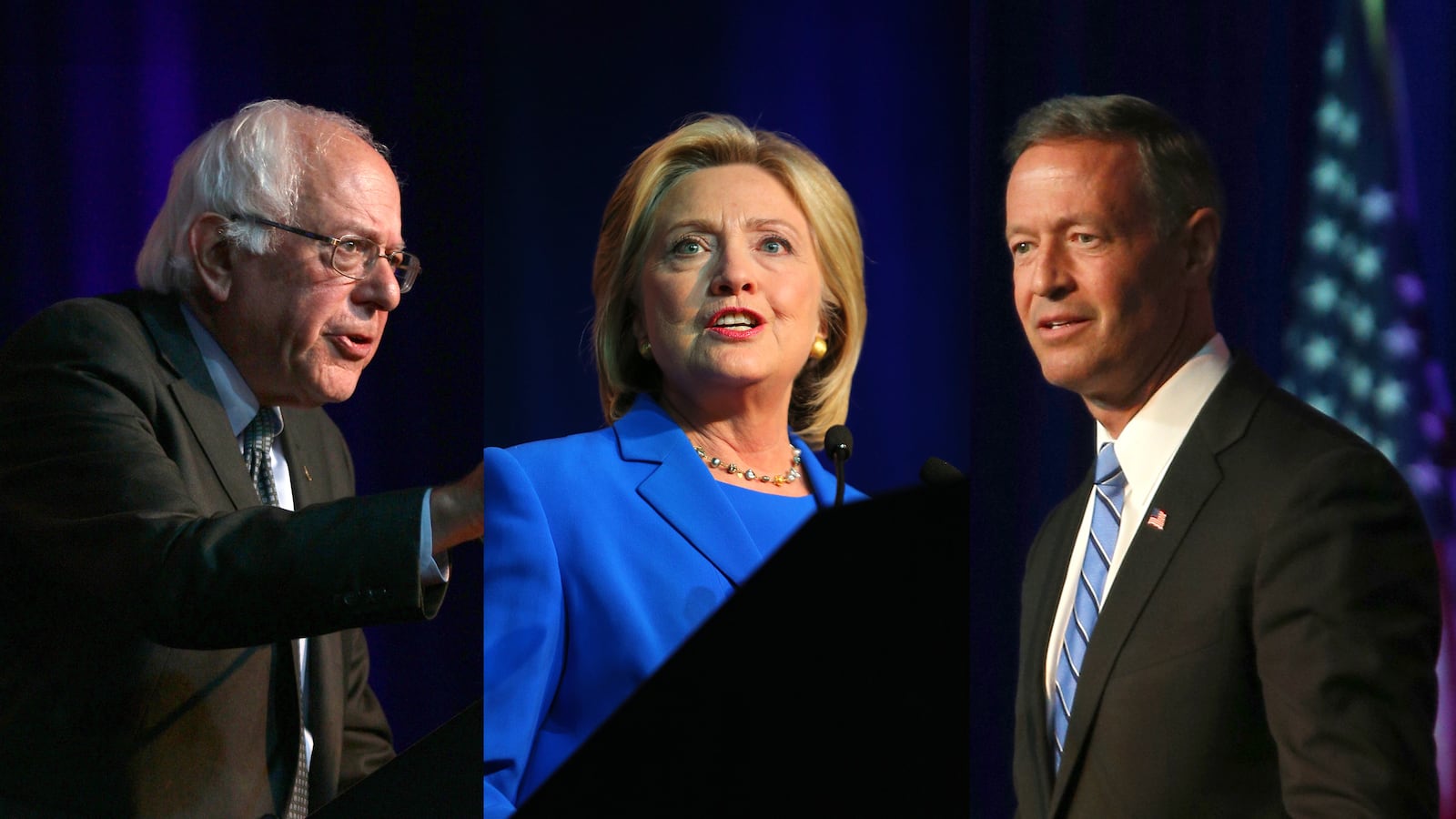There aren’t going to be a lot of “Minnesota nice” jokes coming out of this weekend’s Democratic National Committee meeting here in the Twin Cities.
Sure, speakers did obligatory eye-pops at the promise of state fair food, made Garrison Keillor references, and sang Paul Wellstone praises. But there were two ardent, rabble-rousing speeches by underdog candidates that made it a Democrat-on-Democrat bloodbath all afternoon.
Coming into 2016, the DNC crafted a debate schedule apparently designed to usher Hillary Clinton through a gentle primary process. The committee may have protected her, today’s meeting showed at what cost. Clinton’s two main rivals used the DNC as a backboard for bank shots at her. The DNC itself was a target, and Clinton’s challengers hit at it repeatedly and to great applause.
Former Maryland governor Martin O’Malley hooked his entire speech around a linguistic barb, calling out the Democrats’ lack of debates for being literally “undemocratic.” More daringly, Senator Bernie Sanders warbled a doomsday tune: If the Democrats continue with “politics as usual,” “establishment politics or establishment economics,” he warned, then they “will not retain the White House, will not regain the Senate, will not gain the House and will not be successful in dozens of governor’s races.” The only part of his speech that wasn’t vicious criticism was clearly a lie: “With all due respect,” he said, “and I do not mean to insult anyone here.”
Well, on that last part Sanders might well tell true. By the time he had spoken, Hillary Clinton wasn’t there.
Cynics might say that was according to plan. The day’s speaking schedule, advertised as being in alphabetic order, put Clinton in a sweet spot: mid-morning, right after a wistful and mild Lincoln Chaffee. Not a bad expectation-setter, as opening acts go.
More fodder for those looking for conspiracy: Her speech went 10 minutes longer than the committee claimed to allow. Her lack of nerves showed. She hit every mark, nailed every applause line and even summoned some laughs. (Truly, Donald Trump’s most significant Democratic donation is in-kind: He’s given Hillary a punchline that’s not about email, and a few more about hair.)
Her delivery reflected the deliberate lack of urgency her entire campaign wants to convey. Going into the the committee’s meeting, the Clinton campaign placed a story claiming the primary all but over before a single vote has been cast. With 130 superdelegates already publicly committed, Clinton officials told “supporters and the undecided” that “private commitments increase that number to more than 440—about 20 percent” of what she needs to for the nomination itself.
I have my doubts about that story, mainly because it’s impossible to check. But as important as whether it’s true is that Clinton’s people want everyone to believe it.
Sanders’s success in turning out crowds has given him the most obvious retort. At the meeting itself, his supporters were raucous and eager to stand, rising from their chairs to thunder approval at a litany of not just good progressive causes (from mass incarceration to the minimum wage)—the same stuff of Hillary’s speech hours before. Even more insistently, they hooted encouragement at Sanders’s thundering against the establishment that Sanders was there to address. His argument was Sanders-centered but succinct: I am generating crowds and excitement, and without them, the Obama coalition is going to stay home.
O’Malley’s argument was necessarily more small-bore, but ingeniously formed. Sanders’s doomsaying was non-specific and grim—invoking the specter of loss but not focusing that much on what they’d lose to. O’Malley, on the other hand, mounted a race against Trump—and his platform was simple: “We’re better than this.” Without more debates, he asserted, the Democratic Party will cede the whole conversation: “Will we let the circus run unchallenged on every channel, as we cower in the shadows under a decree of silence in the ranks?”
Sanders’s crowd may have been more ardent, but O’Malley’s rhetoric was craftier—lines like that prodded applause that seemed to fade in confusion, as if Hillary supporters could not help but endorse a distinction between their party and Trump, but then had to remember who was drawing the distinction from whom.
Both Sanders and O’Malley’s boldness fell short of breaking the Clinton omerta from the podium. They declined to furnish ad fodder for next fall. But in the press conferences afterwards, egged on by reporters to go from bank shots to point blank, both men were unable to resist direct jabs.
Both were asked whether the debate schedule was rigged in Hillary’s favor, and both simply said, “Yes.” O’Malley in particular couldn’t wait to say more. He was proud of how obvious he’d been: “I don’t think I was hinting, I thought I was pretty clear.” Sanders dredged up some sarcasm when a reporter wanted to know if by “establishment” he meant Hillary: “I’ll let you use your imagination on that.”
Who knows what Clinton makes of all this. Defensive mode, ironically, is what she does best.






